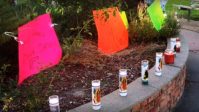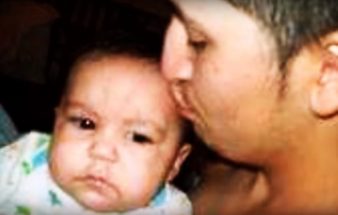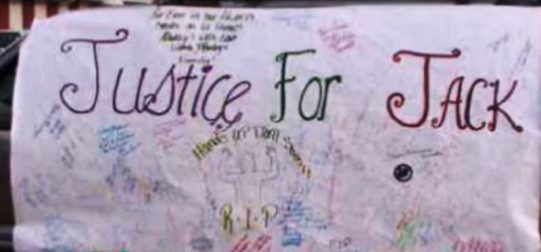LA JUNTA, Colorado-The murder trial of former Rocky Ford police officer James Ashby who fatally shot in the back a Rocky Ford resident in his own home is in its tenth day with two defense witnesses taking the stand along with the defendant. Ashby fatally shot Jack Jacquez, 27, as Jacquez was returning home from babysitting a friend’s children the evening of October 12, 2014 according to his family.
As reported by those present at the scene of initial contact and Colorado Bureau of Investigation (CBI) reports, Jacquez was riding his skateboard in the road when Ashby approached and ordered Jacquez out of the road. Jacquez picked up his skateboard and entered the yard of his home while reaching into his backpack where it was later determined by CBI investigators that Jacquez’ backpack held his keys and was free of weapons.
On the stand Ashby said that he chose to testify because it was “necessary for the issue of transparency.” In testimony he painted a picture of a fast-moving scene where he couldn’t remember facts and didn’t have time to think.
Prosecution took the defendant back to Ashby’s on-location walk-through interview done the day of the incident where Ashby said that his initial intent in approaching Jacquez was to have him get off the road where he was using a skateboard as transportation to his home. As Ashby continually referred to Jacquez as the “suspect” and the “bad guy” in testimony, prosecutors asked if that night Jacquez was “suspected of nothing more [than] skateboarding on a road.”
Assistant District Attorney William Coburn questioned Ashby’s initial interview with the Colorado Bureau of Investigation (CBI) later the day of the shooting where the then officer reported that Jacquez did obey his order to get out of the street. Prosecution then questioned why further contact was necessary with Jacquez.
In reply Ashby testified that Jacquez was dismissive of his presence and responded to the officer contact with yelling the words “F–K You!”, but earlier testimony from the passenger in Ashby’s car that night, Kyle Moore who was completing a Civilian Ride-Along did not corroborate Ashby’s claim.
Ashby then followed Jacquez to the back door of the home because he said that there had been burglaries in town and he was suspicious that Jacquez might be burglarizing the home. Prosecution followed with the question, “What linked Jack to any burglary that you know of?” Ashby responded, “He was out late at night, he was wearing dark clothing, and he was carrying a backpack where he could have been carrying burglary tools.”
The prosecution and a question from a juror at different times pressed to have answers about why Ashby did not call for back-up during the encounter which the prosecution quoted from earlier testimony as being “20 seconds away.” Ashby responded that there was no time. Prosecution countered, “Did you call in that you were having civilian contact?,” to which Ashby answered, “no.”
Ashby was also challenged by Coburn to explain why he never identified himself as a police officer to which Ashby responded that he was in uniform and driving a marked car, “I didn’t have time to say, I’m a cop, come talk to me.”
But Assistant District Attorney Coburn pointed that a person has a right to be “dismissive” of the police and that the contact that Ashby made with Jacquez was a “consensual contact.” This type of contact is described in Colorado law when a police officer approaches and initiates a conversation, but the person has the right not to answer and to walk away after asking, “Am I free to leave?”
Ashby argued that a crime had been committed. Colburn asked, “What crime, skateboarding?” to which Ashby responded, “obstructing a police office.” When asked for the definition of “obstructing a police officer” he responded, “the willful disregard of an officer’s presence.”
“So words are an obstacle?” Coburn pushed for a definition, “You said you couldn’t quote verbatim the revised statutes but can you give a legal definition?” to which Ashby replied, “It’s been two years since I’ve read the [Colorado Revised Statute] manual, I cannot define it at this time.”
The jury was then taken by testimony to the scene on the night of the shooting where Jacquez is reported to have walked to the back door of his home after first contact with Ashby. Coburn asked Ashby, “You grab him and you hold your gun in his face?” to which Ashby affirmed that he did. “Did you hear him say ‘Mom! Mom!?” the question to which Ashby answered that he didn’t.
When asked why Ashby did not identify himself he responded that he didn’t have time and, “I figured saying ‘stop’ in a fully marked police car. The only time you’re required to identify yourself is when you’re serving a warrant, in an unmarked car or not uniformed.”
Ashby defended his actions on several occasions referring to the lack of lighting late at night drawing questions from the prosecutor and separate questions from the jury asking why he did not use his flashlight to which Ashby responded, “A flashlight is a luxury item.” On another occasion he answered, “I was holstering my gun and didn’t have a free hand.”
During questioning by his own legal team Ashby used stronger language to describe the interaction when he first stopped Jacquez: [Jacquez] “hit the bushes,” and that Ashby became scared because of the “explosive” nature of [Jacquez’] contact.
Ashby’s attorney Michael Lowe then switched the onus of the scene to Jacquez, “Did [Jacquez] give indication that he did not know you were a police officer? Did [Jacquez] even say, ‘I live here, I’m going home.'” Ashby responded that Jacquez did not.
Lowe then tapped into the scene from Ashby’s emotional and physical perspective, especially to the revisited topic of the lack of light. Earlier one juror asked if the blinking lights from his patrol car would have provided light and another referred to his declining the use of his flashlight. Ashby answered again that there was no time for a flashlight and that the “ambient light [was] blocked by my body. It was already dark and I remember it getting darker.”
When asked by Lowe the effect it had on him when Jacquez reached into his bag Ashby responded, “It scares us, you can be reaching for an ID or a gun.”
Jacquez’ mother reported that she was awakened by the knocking and her son’s yelling her name and went to the door to open it. She was pepper sprayed by Ashby who defended his actions by saying, “When you spray pepper spray, it’s not an aerosol, it goes everywhere.”
According to Viola Jacquez, Jacquez’ mother, Ashby entered the home behind Jacquez denying that he then became aware that Jacquez was in his own home, and that he intended to place Jacquez under arrest. Although the door was opened by Jacquez’ mother, Ashby defended that he was protecting the occupants of the home and that he intended to arrest Jacquez for resisting arrest. But prosecution asked him what reason he had for arresting Jacquez, and to define “resisting arrest.” Ashby responded, “I can’t define it. I can’t give you an exact definition. I can’t quite verbatim.”
“You can’t define obstructing justice and resisting arrest? You can’t define it but you’re pretty sure Jack was doing it?”
Possibly referring to Ashby’s version that Jacquez pulled him into the home, a juror’s question about Ashby’s size was read to which Ashby responded that he is a little over 6 feet and 250 pounds. Jacquez is reported to have been about 150 pounds.
Ashby then testified that he then saw the outline and blonde color of a bat and that it went though his mind, “I got kids. I have a family. This guy’s got a bat. He can kill me. He can paralyze me.”
Jacquez’ own family was in the home at the time including his mother and fiancee.
Prosecutors challenged Ashby’s statements about his own safety when he testified that his training taught him to move away from a threat yet instead he moved toward the perceived threat of a possible weapon, “On the porch you indicated he might have a weapon yet you approach. Were you angry when you reached the back door?”
“No, I was afraid.”
While prosecution pressed for Ashby to explain why he claimed to have time for some things and not for others Ashby responded, “You have to take the entire scene into account.”
In reference to Ashby’s initial interview about the incident, Coburn asked Ashby to consider “the way we talk to and about other people.”
“In this case you describe Jack as a “little sh-t.”
Defense concluded with former police officer and sole shareholder of the For Science Institute Chris W. Eugene Lawrence of Toronto who studies human perception and reaction times. He attempted to show that humans have time to make a 90 degree turn which would prove why Jacquez was shot in the back and used the example of a baseball player who was hit in the back when he turned to avoid a pitched baseball. But prosecution pointed out that a bullet is smaller than a baseball, the velocity of travel is different between a bullet fired from a gun and a baseball thrown by a human, a baseball player makes a 45 degree turn and not a 90, and that the baseball player is a professional athlete and that Jacquez was not.
Testimony is expected to close Tuesday.




